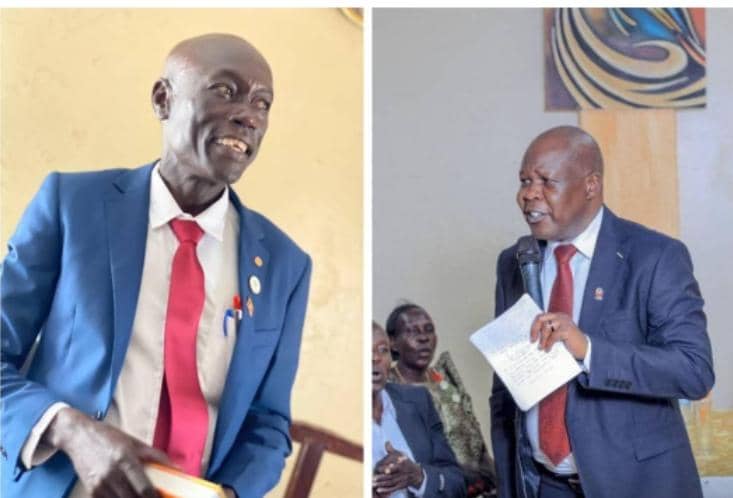
By Teso vibez reporter
After years of simmering tensions, open disagreements, and a fractured leadership landscape in Teso’s secondary education system, two of the region’s most prominent figures Martin Okiria Obore and Wilfred Oluka Okeriau have publicly reconciled. The move, both unexpected and deeply significant, has stunned many in Uganda’s education circles and reignited conversations about leadership, accountability, and institutional healing.
Okiria, a respected educationist and former national chairperson of the Association of Secondary School Headteachers of Uganda (ASSHU), and Okeriau, the current headteacher of Soroti Secondary School and former ASSHU Teso chapter chairperson, had been entangled in a bitter feud dating back several years. Their falling out rooted in leadership transitions, personality clashes, and institutional politics had created rifts not only between the two men but within the wider community of school heads across Teso.
The tensions first surfaced in the aftermath of a controversial leadership reshuffle at Soroti Secondary School. Okeriau’s appointment as headteacher sparked quiet resistance from a faction of senior educators who questioned the process and his leadership style. Those perceived to be aligned with Okiria were accused of fueling discontent, while public criticism some anonymous, others more direct further widened the divide. Matters worsened when Okeriau’s then-deputy allegedly posted inflammatory remarks on social media, intensifying the animosity and reducing attempts at reconciliation to mere formalities.
The impact was far-reaching. The ASSHU Teso chapter grew increasingly polarized, joint initiatives stalled, and professional collaboration among headteachers suffered. Despite several behind-the-scenes mediation attempts by district officials and senior educators, the feud endured—until now.
The breakthrough came quietly but decisively during a closed-door meeting in Soroti City attended by select headteachers and education stakeholders. While initial expectations were modest, the outcome was anything but. Both Okiria and Okeriau emerged from the meeting united, having agreed to end their dispute and commit to a renewed, collaborative approach to leadership.
In a joint statement, the two leaders acknowledged the toll their feud had taken on the education sector. Okiria admitted that prolonged differences had “detracted from the real mission of uplifting schools,” while Okeriau stressed that “reconciliation is a mark of maturity, not surrender.” The moment was sealed with a handshake—symbolic for those present and monumental for the region’s education community.
Their reconciliation has been received with relief and optimism. Headteachers across Teso, who for years had worked under the shadow of an unspoken rivalry, now see an opportunity for meaningful engagement and renewed unity. Rosemary Asekenye, a senior headteacher from Kumi, described the development as “a new dawn,” saying the long-standing divide had crippled efforts to address core challenges in secondary education such as academic performance, teacher morale, and infrastructure deficits.
But what finally brought the two men to the table?
According to insiders familiar with the talks, growing pressure from senior education officials, the looming ASSHU Teso regional conference, and concerns about their legacy played critical roles. Both men, respected in their own right, reportedly came to recognize that continued hostility risked undermining their contributions to education and weakening the institutions they had worked hard to build.
Beyond symbolism, the reconciliation comes with a plan. Okiria and Okeriau have agreed to co-chair the upcoming regional conference, where they will oversee the drafting of a five-year strategic plan for the education sector. They also intend to launch a leadership mentorship program for aspiring headteachers, focused on ethics, professionalism, and conflict resolution a direct response to the very issues that once divided them.
Critics have cautioned that while the reconciliation is welcome, rebuilding trust within the broader education network will take time. Some have called for deeper reforms in how leadership transitions are managed and how grievances are addressed within school administrations. Others have questioned the sincerity of the move, suggesting it could be motivated by political or professional expediency.
Still, the broader sentiment is one of hope. For a region where education is not just a service but a pillar of community identity, the mending of such a high-profile feud sends a powerful message. Leadership, when grounded in humility and vision, can overcome division. And in the case of Okiria and Okeriau, that message could not have come at a more critical time.
As the two men turn the page on a rivalry that once threatened to derail progress, the path ahead remains challenging but also newly open. What they do next, together, may ultimately define their legacy more than the conflict that nearly tore them and Teso’s education system apart.